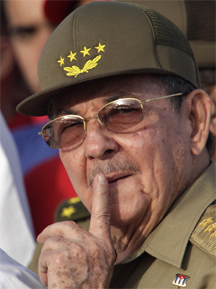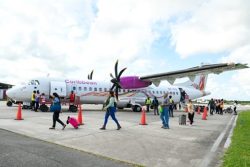It sounds like a joke, but it isn’t: At the end of this month, the 33-country Community of Latin American and Caribbean States (CELAC) — a two-year-old organization that lists promoting democracy among its top goals — will swear-in Cuban dictator General Raúl Castro as its new chairman.
 What’s just as crazy, General Castro will become Latin America and the Caribbean’s official spokesman in political and trade negotiations with the 27-country European Union and other world blocs during his 12-month tenure. Castro will take over CELAC’s leadership from Chilean President Sebastian Piñera at a CELAC-European Union summit in Chile on Jan. 28, and is to pass on the group’s leadership to the Costa Rican president in January 2014.
What’s just as crazy, General Castro will become Latin America and the Caribbean’s official spokesman in political and trade negotiations with the 27-country European Union and other world blocs during his 12-month tenure. Castro will take over CELAC’s leadership from Chilean President Sebastian Piñera at a CELAC-European Union summit in Chile on Jan. 28, and is to pass on the group’s leadership to the Costa Rican president in January 2014.
European diplomats, who pride themselves on attaching “democracy clauses” demanding free elections to their countries’ trade agreements with developing nations, are already shaking their heads about the prospect of appearing in smiling pictures with General Castro.
Cuba has not allowed a single free election, or an independent newspaper, in more than five decades. As one European diplomat told me, no matter what redeeming circumstances his supporters may cite, General Castro is a military dictator under any definition of any dictionary in the world.
Granted, while CELAC’s creation was heralded by Venezuelan President Hugo Chávez in April 2011 as Latin America’s “most important political event in more than 100 years,” it’s seen by many as an empty shell. CELAC is largely a summit organizer: It has no headquarters nor a permanent staff, and it is run by a rotating, one-year chairmanship held by the country that is elected.
The group was created to bring together Latin American and Caribbean countries without the presence of the United States and Canada, and Chávez said he hoped it will soon replace the Washington-based Organization of American States (OAS), which he has described as a US puppet.
But, while CELAC is just the latest of many similar regional groups that were quickly forgotten after grandiose debuts, the fact is that its 33 member governments have assigned it event-organizing functions. That means that CELAC has the power to convene and set the agenda of some regional and bi-regional meetings, which — while all of the group’s decisions are taken by consensus under internal rules — is nothing to be sneered at.
Ironically, CELAC’s founding document signed at the Feb 23, 2010, Latin American and Caribbean Summit at Rivera Maya, Mexico, specifically states that the new group will promote democracy and human rights.

Article No 3 of the CELAC charter signed in Rivera Maya states that the group “reaffirms that the preservation of democracy and democratic values, the respect for institutions and the rule of law” and the “preservations of all human rights for all, are essential goals of our countries.”
Isn’t it a joke that a regional organization committed to democracy elects as its new chairman none other than the region’s last military president, I asked OAS Secretary General José Miguel Insulza in a wide-ranging interview this week.
Perhaps trying not to criticize a rival organization, Insulza responded: “The fact that the president of Chile, who is by no means precisely a leftist, hands over CELAC to Raúl Castro shows a new climate of tolerance and understanding in Latin America.”
My opinion: Hmm. I respectfully disagree. This is not a matter of right and left, but of democracy and dictatorship.
Unfortunately, Castro, Chávez, and others in recent years have succeeded in changing Latin America’s public discourse to resurrect outdated concepts of ‘right‘ and ‘left.‘ These labels make no sense in today’s world, where China — the world’s biggest Communist country — has become the Mecca of capitalist investments.
As somebody who has always opposed both rightist and leftist dictatorships — and, for the record, immediately condemned both the 1992 coup attempt by Chávez and the 2002 coup attempt against Chávez — I don’t think that General Castro’s appointment as new CELAC leader is a sign of any kind of “new tolerance” that should be praised.
On the contrary, it is a betrayal of democratic and human-rights principles that many have fought hard to win.
If Latin American leaders want to be taken seriously, they should either delete the promotion of democracy from CELAC’s founding principles, or keep from passing on the CELAC chairmanship to General Castro. They can’t claim to defend democracy while they appoint the region’s worst dictator to lead their group.





